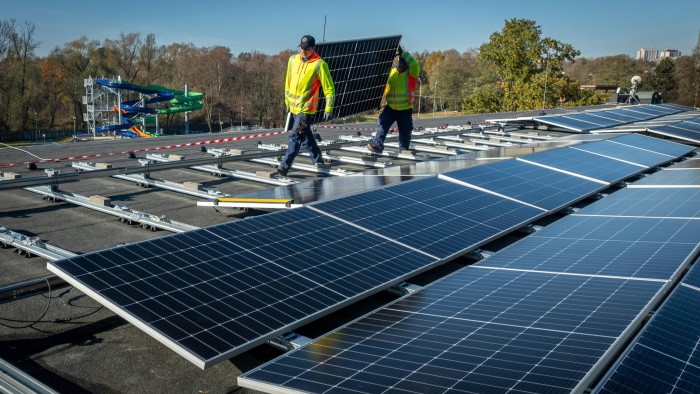Investors are threatening to sue the Czech government over planned cuts to solar power subsidies, the latest dispute highlighting how Europe’s cash-strapped governments are struggling to finance the bloc’s green transition.
Three solar developers have warned Prague about possible lawsuits if the government goes ahead with plans to retroactively lower subsidies for photovoltaic installations connected to the power grid as far back as 2009.
The move comes after several European countries such as Poland and Germany have started to reconsider subsidies for renewable energy technologies, with the industry warning that the EU risks missing its climate goals if this trend continues.
“This is a big canary in the coal mine indeed,” said Walburga Hemetsberger, chief executive of the industry body SolarPower Europe. She added that the move could set a dangerous precedent for other governments and that it was “paralysing future projects”.
The Czech government has defended the draft law, arguing that the cost of financing the solar sector should not excessively burden taxpayers and should be brought down in line with the country’s budgetary constraints.
The European Commission said that it was monitoring the Czech decision and had been in touch with the parties involved.
The EU has set itself ambitious targets for cutting emissions and developing clean energy sources, sped up by the bloc’s need to wean itself off Russian fossil fuels following Moscow’s full-scale invasion of Ukraine in February 2022.
But red tape and supply chain issues, and calls from European manufacturers not to buy cheaper Chinese panels that risk undercutting the bloc’s industry, have in some places delayed the switch to renewable energy.
The Czech Republic has among the fewest solar parks in central and eastern Europe, with coal still making up more than a quarter of its energy mix, according to the International Energy Agency.
Despite lagging behind its neighbours, the country’s recent move to further de-incentivise investment in renewable energy “is a warning to investors to take their money elsewhere”, said Jan Krčmář, executive director of the Czech Solar Association. “This is a signal for investors that . . . the laws of the game can be changed at any point during the match.”
Prague set up its solar subsidy regime in 2005 for a 20-year period, which successfully kick-started solar development as financiers looked for safe, government-backed investments.
Thousands of households, small businesses and international investors took out loans to install solar panels that are in many cases still being repaid. The government pays about €1bn to €1.2bn in subsidy support annually, according to the Czech Solar Association.
The Czech government last year told Brussels in its assessment of how it plans to meet climate goals that it wanted to roll out renewable energy sources faster, but that a “lack of subsidy support” was the main reason for the country’s “stagnation” in the area.
Pavel Maleček, head of asset management at Enery, the country’s third-largest solar operator, said that Prague’s proposed changes “pose a significant risk” to ongoing and future projects.
“Such changes could lead to bankruptcies and yield far fewer savings than the ministry of finance expects,” Maleček said.
Enery is one of the three investors that has threatened to sue, along with Voltaic Network and Photon Energy. Georg Hotar, CEO of Photon, said his company would demand “appropriate compensation from the Czech state” for slashing their return on investment if the new law came into force.
Voltaic Network, a German company, told the commission in a letter seen by the Financial Times that along with dozens of other investors, they “face the risk of power plants going bankrupt” and “wiping out billions of dollars in investments”.
The investors plan to sue Prague under the Energy Charter Treaty, an international agreement originally aimed at protecting western investors after the collapse of the Soviet Union.
Spain has been fighting multiple multimillion euro cases against renewable investors under the ECT, after altering the terms for subsidies in the wake of the 2008 financial crisis that then also forced a bailout of Spanish banks.
France also cut subsidies in 2010, resulting in heavy job losses across its solar sector.
The Italian government this year announced it would limit the rollout of solar panels on farmland, with developers warning that Rome risks missing its climate goals. Italy, Poland and Germany have all announced cuts to heat pump subsidies in recent years.
For the fragile coalition of Czech Prime Minister Petr Fiala, the solar funding cuts present a fresh challenge after last month’s departure of a coalition partner, the Pirate party.
The government hopes that the parliament will approve its new solar legislation before the year-end, but several of Fiala’s coalition lawmakers abstained from voting last week in a parliamentary committee.
The subsidy dispute comes as Czech households struggle to pay some of Europe’s highest electricity bills, while companies look to source energy elsewhere. T-Mobile Czech Republic in June signed an agreement to receive renewable power from Romania.
The country risked becoming a net importer of electricity, warned Pavel Rek, a director at Tedom, a Czech energy and engineering company. If the government finally pushed through the controversial cut in solar subsidies, then it should at least reallocate the money to “restore subsidy support for electricity prices”, Rek said.
Additional reporting by Amy Kazmin in Rome
Read the full article here

